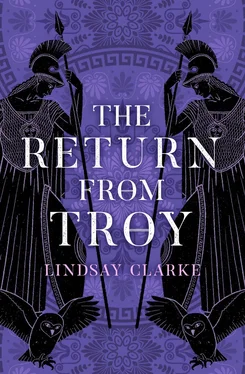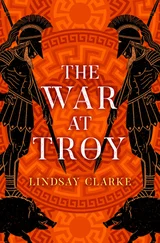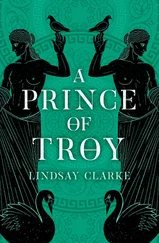Telemachus led the cheers that greeted her words. I joined in roundly; but so close was the attention I paid to the nuances of my lady’s face these days that I could not miss the pensive shadows that settled briefly about Penelope’s eyes and mouth moments later when she thought herself unobserved.
Zarzis Contents Cover Title Page THE RETURN FROM TROY Lindsay Clarke Copyright Dedication Map The Pledge Redeemed The World Turned Upside Down Zarzis The Young Lions Nobodysseus The Wind-Callers A Game of Shadows Telemachus The Mysteries Menelaus The Homecoming The Winnowing Fan Glossary of characters Acknowledgements Also by Lindsay Clarke About the Publisher
The Thracian shore vanished in the unnatural brown gloom of the light from the thunderheads just as the skies were torn open by a ferocious strike of lightning. The mast and rigging of a nearby ship combusted into flame. A moan went up from the oarsmen of the struck ship when the mast cracked and the scorching yardarm fell among them. Oars clattered together in the swell as the rowers leapt in panic from the benches. The vessel lost way, yawed and turned broadside on to the waves. Only moments later, it was pushed over onto its side like a tipped bucket, hurling men into the clamour of the seas.
Two hundred yards away, scarcely able to hold their own against the might of the billows breaking over their prow, Odysseus and his crew were forced to watch their comrades drown while the exposed keel of the capsized ship rose and fell. Another pang of lightning flashed across the sky. The flames from the blazing spar guttered for a time with an eerie glare, and were extinguished in a sizzling of smoke and steam.
Odysseus caught a last glimpse of a man shouting through the froth of a crest before the sea dragged both him and his stricken ship down into the advancing hollow. The day thickened prematurely into night, and with the darkness came the rain.
Odysseus led the three great shouts for the drowned men who would never now receive proper burial. Some of his crew were already retching as the rain and spray smacked against their faces. With the prow and cutwater mounting the tall wave at his back, Odysseus staggered down the slope towards the stern where Baius was struggling to control the steering oar. He just had time to clutch the sternpost with both hands before his ship took the steep plunge over the crest.
A torrent of water fracturing into spume as hard as hailstones scattered across the decks and benches. Closing his eyes against the tempest, Odysseus felt the whole world lurching under him. The clamour of thunder merged with the clash of waves in a great collapsing roar. When he opened his eyes the deck-boards were awash and it seemed that The Fair Return was hurtling through a green-black passage twisting into foam, where sky was indistinguishable from sea and both were inimical to the survival of his ship.
Baius, who had sailed with Odysseus many times, had already divined his intention. The two men braced themselves together at the steering oar, looking to keep their vessel from being taken aback or swept broadside by the strength of the swell. A green light glittered about the masthead as lightning seared the sky. Over the noise of thunder Odysseus shouted to his men to ship their oars before they were snatched from their grasp. Then The Fair Return was running before the wind and there was nothing to be done but hang on to the straps and thole-pins while the cutwater of the frail craft plunged and climbed across tremendous seas.
He woke to the sound of palm fronds rattling in a breeze off the sea. Swallows scudded through the high blue zone beyond the fringes of a thatched awning above his head. He could hear the sigh of surf breaking on the shore and, somewhere closer, the laughter of men and women chatting together over the reedy sound of a flute. The tune seemed to wobble on the hot, dry air. When Odysseus lifted himself on to his elbows to look around, his eyes were dazzled by the flash of sunlight off white sand. Then he made out the sinewy body of Eurylochus stretched out on a dune, wearing only his breech-clout, while a woman whose skin was black as grapes leaned her long breasts across his chest. Beyond them, more members of his crew clapped their hands as a drum struck up. Another woman began to sway to the tune of the flute while, further down the strand, a small boy carrying a catch of sponges smiled and stared. Odysseus closed his eyes, shook his head, looked round again, and only then did he see a small town with shining buildings and terraces and date-palms – all as it should be, in perfect detail, except that it was hanging upside down in the sky. After a moment it began to shimmer like the haze above a fire.
He thought to himself, ‘I am surely dead and in the Land of Shades.’
A voice behind him, thickly accented and throaty, said, ‘So you are awake at last,’ and Odysseus turned to see a neatly bearded man reclining in the shade. He wore a finely woven robe of deep-blue linen. His skin was as swarthy as his voice, an oily chestnut-brown, wrinkling under the high, turbaned overhang of his brow. His nose curved like a kestrel’s beak.
Odysseus said, ‘Have I been sleeping long?’
‘For two nights and the better part of three days,’ the stranger nodded. ‘You were, I think, a truly exhausted man.’
Remembering the long struggle with the worst seas he could recall ever having encountered, Odysseus merely nodded and sighed.
‘That town,’ he remarked vaguely, ‘appears to be upside down.’
‘Yes,’ the foreigner answered, ‘it appears so. In fact it is not there at all.’
‘Then my eyes are deceiving me.’
‘Not your eyes but the light. I know the place. It is perhaps forty miles from here. The desert air works such trickery. In a little while it will be gone again.’
‘In my island,’ Odysseus replied, ‘buildings prefer to remain where we put them.’
‘But then Ithaca is not Zarzis.’
‘Zarzis?’
‘You are in Libya, my friend, in the land of the Gindanes.’
Odysseus frowned. ‘We were blown right across the Cretan Sea?’
‘So your men tell me. Your three ships are beached over there.’
‘Only three?’
‘In such a storm perhaps the sea was merciful to spare so many?’
Odysseus tried to get to his feet, but his head swirled with a dizziness that was not entirely unpleasant. Like a drunkard puzzled by his condition, he sat back down again. Despite the calamitous news he was strangely untroubled. In fact, he felt oddly serene, with a degree of acceptance that was more dream-like than philosophical. Life came and went, men lived and died, ships floated for a time then sank, and if a town saw fit to shift itself forty miles across the desert air and then hang head-down like a bat as it snoozed in the afternoon sun, well that was fine by him. And the music too was mildly narcotic. In fact the more he thought about it, this languid country, of which, if truth were told, he had never previously heard, was a pleasant enough place to fetch up.
‘The Land of the Gindanes, you say?’ Odysseus studied the smiling, magisterial figure across from him. For the first time he noticed two dark patches at his temples where the skin might have been scorched by fire a long time ago. ‘And you are a king among these people?’
‘By no means,’ the Libyan smiled, ‘I am a king nowhere. Merely a wanderer filled with curiosity about the world.’ Relaxing back against a pile of fringe cushions, he told Odysseus that his name was Hanno, that he came from a peace-loving people called the Garamantes, who lived to the south of Lake Tritonis, and that he liked to travel wherever the desert winds blew him.’
‘Have you sailed to Argos then,’ Odysseus asked, ‘that you speak our language?’
Читать дальше












